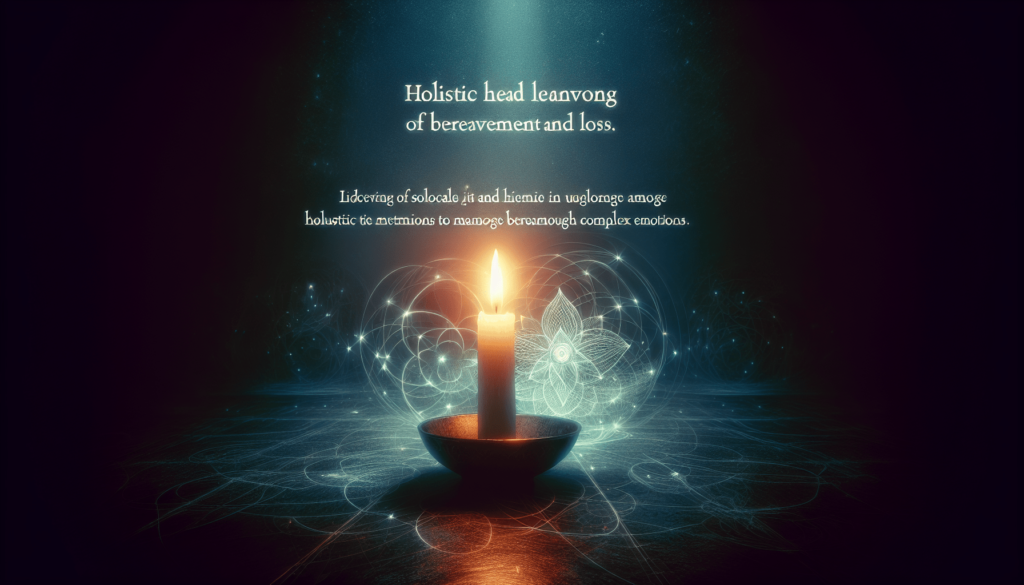Understanding Grief and Loss
Grief and loss are emotions that everyone will experience at some point in their lives. It is a natural response to losing something or someone that you care about deeply. It can be overwhelming and may impact every aspect of your life. Understanding the process of grief and loss can help you navigate through these emotions.

What is Grief?
Grief is a multifaceted response to loss, particularly the loss of someone or something to which a bond was formed. It can manifest in various ways, including emotional, physical, and spiritual responses. It is a natural part of life and can affect individuals differently.
How Does Loss Manifest?
Loss can manifest in different ways, such as losing a loved one, a job, a relationship, or even a pet. The feelings of loss can be intense and may trigger a range of emotions, including sadness, anger, guilt, and confusion. It is essential to acknowledge these feelings and understand that they are a normal part of the grieving process.
Coping Strategies for Grief and Loss
Coping with grief and loss can be a challenging journey, but there are holistic strategies that you can incorporate into your life to help you navigate through this difficult time. These strategies focus on healing your mind, body, and spirit to promote overall well-being.
Counseling and Therapy
Seeking counseling or therapy can provide you with a safe space to express your feelings and emotions surrounding your grief and loss. A mental health professional can offer guidance and support as you navigate through the grieving process. Talking to someone who is trained to help you cope with grief can be incredibly beneficial.
Support Groups
Joining a support group of individuals who are also experiencing grief and loss can be comforting and therapeutic. Sharing your thoughts and feelings with others who understand what you are going through can help you feel less alone. Support groups provide a sense of community and connection during a time of isolation.
Mindfulness and Meditation
Practicing mindfulness and meditation can help you stay present and grounded during moments of intense grief. Mindfulness techniques, such as deep breathing and body scans, can help you manage overwhelming emotions and promote relaxation. Meditation can provide a sense of peace and clarity amidst the chaos of grief.
Physical Exercise
Engaging in regular physical exercise can have a positive impact on your mental and emotional well-being during times of grief and loss. Exercise releases endorphins, which are known as “feel-good” hormones that can improve your mood and reduce feelings of sadness and anxiety. It can also help you cope with stress and promote better sleep.
Holistic Approaches to Grief and Loss
In addition to traditional coping strategies, there are holistic approaches that you can incorporate into your life to help you cope with grief and loss. These approaches focus on treating the whole person, including the mind, body, and spirit, to promote healing and well-being.

Acupuncture
Acupuncture is an ancient Chinese healing practice that involves inserting thin needles into specific points on the body to promote healing and balance. It can help alleviate physical and emotional pain associated with grief and loss. Acupuncture can also help reduce stress and anxiety, allowing you to find relief and relaxation.
| Acupuncture Benefits |
|---|
| – Reduces stress and anxiety |
| – Improves sleep quality |
| – Enhances emotional well-being |
Aromatherapy
Aromatherapy uses essential oils derived from plants to promote physical and emotional well-being. Certain essential oils, such as lavender and chamomile, can help reduce stress, anxiety, and insomnia. Aromatherapy can be used through inhalation or topical application to help calm your mind and body during times of grief and loss.
| Aromatherapy Oils |
|---|
| – Lavender |
| – Chamomile |
| – Rose |
Reiki
Reiki is a form of energy healing that involves the practitioner laying hands on or near the body to channel healing energy. It can help promote relaxation, reduce pain, and restore balance and harmony to the mind, body, and spirit. Reiki can be a calming and soothing practice during times of grief and loss.
| Reiki Benefits |
|---|
| – Promotes relaxation |
| – Reduces pain and discomfort |
| – Restores balance and harmony |
Self-Care Practices for Grief and Loss
Taking care of yourself is essential when coping with grief and loss. Self-care practices can help you nurture your mind, body, and spirit during this challenging time. Incorporating self-care into your daily routine can provide you with comfort, peace, and healing.
Journaling
Expressing your thoughts and emotions through journaling can be a therapeutic and cathartic practice during times of grief and loss. Writing down your feelings can help you process and make sense of your emotions. Journaling can be a creative outlet for self-expression and can provide you with insight into your healing journey.
Gratitude Practice
Practicing gratitude can help shift your focus from loss to appreciation for the positive aspects of your life. Taking time to reflect on the things you are grateful for can help you find moments of joy and peace amidst your grief. Gratitude practice can cultivate a sense of optimism and resilience during difficult times.
Mindful Eating
Mindful eating involves paying attention to the food you consume and being present during meals. Eating mindfully can help you nourish your body and mind during times of grief and loss. It can also be a form of self-care that promotes overall well-being and supports your healing journey.
Creative Expression
Engaging in creative activities, such as art, music, or dance, can help you express your emotions and process your grief in a different way. Creative expression can be a healing outlet for your feelings and can provide you with a sense of peace and clarity. It allows you to explore your emotions and connect with your inner self.
Healing Rituals for Grief and Loss
Healing rituals can provide comfort and solace during times of grief and loss. These rituals can help you honor and remember the person or thing you have lost and can provide you with a sense of closure and healing. Incorporating healing rituals into your life can help you navigate through your grief journey.
Creating a Memory Box
Creating a memory box filled with mementos, photographs, and keepsakes of the person or thing you have lost can help you preserve their memory and honor their legacy. A memory box can be a tangible way to keep their spirit alive and to remember the love and connection you shared.
Planting a Memorial Garden
Planting a memorial garden in honor of the person or thing you have lost can provide you with a peaceful and healing space to reflect and remember. Cultivating flowers, plants, or trees in their memory can be a symbolic way to honor their life and create a lasting tribute to their legacy.
Writing a Letter
Writing a letter to the person you have lost can be a cathartic and healing practice. Expressing your thoughts, feelings, and memories in a letter can help you process your grief and say goodbye in your own way. Writing a letter can provide you with a sense of closure and healing.
Conclusion
Coping with grief and loss is a deeply personal and challenging journey, but incorporating holistic strategies into your life can help you navigate through these difficult emotions. By focusing on healing your mind, body, and spirit, you can promote overall well-being and find comfort and solace during this time. Remember that grief is a natural part of life, and it is okay to seek support and guidance as you heal and move forward. You are not alone in your grief journey, and there are resources and tools available to help you cope and find healing. Take care of yourself and prioritize your well-being as you navigate through the process of grieving and healing.

